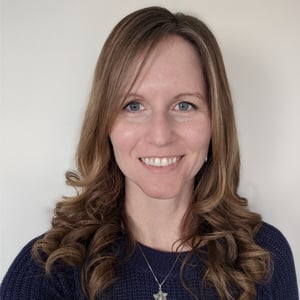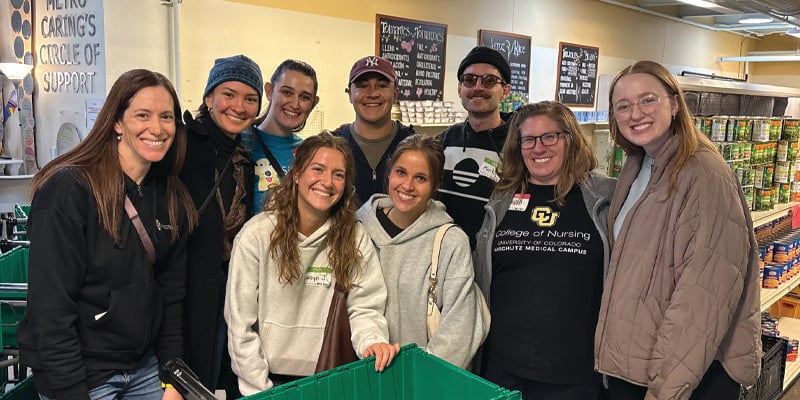There’s a devastating need for maternity care in rural communities: over 2 million women in the US live in areas without access to birth facilities or maternity care providers. In Colorado, nearly 40% of counties are maternity care deserts. Colorado has 65,000 annual births, about 8,000 of which happen in rural communities.1
Maternity deserts are one reason why infant mortality (6.49 per 1,000 births vs. 5.6 per 1,000 births) and premature birth rates (>9% vs. 6%) are higher in rural areas compared to Colorado’s urban areas. Thirty percent or more of pregnant people in Colorado received inadequate prenatal care in areas considered maternity care deserts. Access to maternity care is lowest in counties with higher proportions of publicly insured or uninsured individuals.
Addressing Maternity Care Deserts |
Recognizing the critical need for more access to care, the University of Colorado College of Nursing at Anschutz Medical Campus created a scholarship to train midwives who will practice in rural areas. The scholarship covers expenses (tuition, fees, stipend for living expenses) for 3-5 full-time students per year. Graduates must agree to practice in rural areas.
CU Nursing awarded scholarships to five students for its first cohort in the Rural Midwifery Track, who are expected to graduate in 2025. The track is part of the college’s Nurse-Midwifery (NMW) Graduate program. Funding comes from a $2 million Health Resources and Services (HRSA) Grant and creates the Colorado Rural Midwifery Expansion Program.
“CU Nursing is so excited to have five students in the first Rural Midwifery Track cohort,” CU Nursing Center for Midwifery Assistant Professor Denise Smith, PhD, CNM, FACNM, says. “We are committed to expanding maternal healthcare access in rural areas and are looking forward to offering a quality midwifery education to these students who have a passion for being a part of rural communities. I think most people want to give birth in their own community, and our long-term goal is a midwife for every community.”
Smith will run the Colorado Rural Midwifery Expansion Program with Assistant Professor of Clinical Practice and Specialty Director of Nurse-Midwife Program Shannon Pirrie, DNP, MS, CNM.
Meet the students in the first cohort:
Stephanie Brooks
Hometown: Denver, CO; currently lives in Thornton, CO
Brooks received her BS in Nursing from CU Nursing in 2013. She says she’s thankful for this scholarship opportunity for rural nurse-midwifery.
“It feels amazing to know that I will be able to make a difference in the lives of people who have little or no access to healthcare,” she says. “I’ve always wanted to live in a rural area, and I’ve wanted to help the underserved population that live in rural areas and people who have a hard time getting access to care.”

CU Nursing student Brittany Dunn |
Brittany Dunn
Hometown: Valparaiso, IN; currently lives in Denver, CO
Dunn wants to work at an established practice in a rural area, before eventually working to bring a midwifery practice to a different rural area lacking midwifery services. She previously attended CU Nursing and graduated with a BS in Nursing through the college’s Accelerated (UCAN) program in 2022.
“This is an incredible opportunity to be awarded this scholarship,” she says. “This scholarship is removing financial barriers and setting student midwives up with training, networks, and experience that we’ll need to become midwives in a rural setting.”
She says the Rural Midwifery Track offers several opportunities for her to continue her education while helping increase access to maternal care.
“I have strong ties to Leadville, CO, where the obstetric practice at their Critical Access Hospital has been closed since 2005. The discontinuity of care, the drives down mountain passes in labor, and a lack of access to midwifery care has always stood out to me as inequitable, and those are problems that all our rural populations face,” she says. “I have always had a passion for bringing the midwifery model of care to people who have limited access, but previously I thought that rural midwifery work was not a reasonable career goal due to the financial and practical constraints. The Rural Midwifery Track erases many of those barriers, and I was so excited to see the program created this year and get the chance to be a part of it.”

CU Nursing student Tessa Huizenga |
Tessa Huizenga
Hometown: Lusk, WY; currently lives in Parker, CO
Huizenga says being awarded a scholarship for the Rural Midwifery Track will help her far beyond helping pay for her education, including specialized clinical experiences to prepare her for rural practice.
She grew up in a town with a population of about 1,400 people. She lived for more than a decade in larger cities and began to miss the small-town life, and wants to move back to her hometown after graduation.
“I moved to Hot Springs, South Dakota a few years ago, and realized how much a tight-knit community means to me,” she says. “I love the slower pace of life and the ability to get to know your patients – in and out of the clinic.”
“Rural midwifery is where my heart lies, and being awarded a spot in this track where I can focus specifically on this population is an amazing opportunity,” she says. “This scholarship will allow me to leave school without debt and with the specific education and experience that I will need to be successful when I move back to a small town.”
Huizenga recently started her outpatient clinicals at the UCHealth Center for Midwifery. She says she will likely spend a few weeks each semester there, and the rest in a rural area, possibly Glenwood Springs.

CU Nursing student Arielle Flom |
Arielle Flom
Hometown: Virginia Beach, VA; currently lives in Ft. Collins, CO
Arielle Flom is excited to see herself as a pioneer being part of the Rural Midwifery Track’s first cohort.
“I’m excited to be able to help the underserved and be part of a program committed to increasing access to care,” she says.
Flom previously worked as a medical assistant where she was able to help people who were part of different socio-economic groups and people living in rural areas. She noticed how they had a longer travel time and saw there was a huge gap in care.
“This is when I realized I wanted to be able to help close gaps in health disparities and disadvantages,” she says. “With rural patients, I appreciate establishing rapport, building trusting relationships, and being part of a client’s learning process to better take care of themselves.”

CU Nursing student Raquel Rhea |
Raquel Rhea
Hometown: Duncan & Edmond, OK; currently lives in Denver, CO
Raquel Rhea recently moved to Denver after working as a travel nurse for the past three years. She was most recently working on a labor and delivery travel nursing contract in northern California, where the largest Level 1 Tertiary Hospital was six hours away. While in California, she learned about CU Nursing’s Rural Midwifery Track.
“I was very impressed with the level of knowledge, skill, and resourcefulness of the nurse midwives, family medicine physicians, and other health care providers to provide a high level of care despite the limited resources,” she says.
Rhea says being awarded this scholarship is an incredible opportunity to help her gain essential skills to serve people in rural areas.
“The midwifery program at CU Nursing is going above and beyond to provide us the best resources to be successful as we enter into practice as a rural nurse midwife,” she says. “I hope to work in a rural part of Colorado or northern California after graduation. Being from a small town in southern Oklahoma, I look forward to the peacefulness of rural living again and being able to serve a community that would otherwise have limited to no access to obstetrical and gynecological care.”
CU Nursing has already partnered with several organizations for the program, including the Colorado Rural Health Center and six rural midwifery practice sites in western and southern Colorado.
The $2 million HRSA Grant is expected to run through September 2027. It will include peer support, mentorships, rural education experiences, and employment preparation for midwifery practice in rural Colorado. Three to five students will be admitted per year, for a total of 14 midwives. CU Nursing is currently recruiting nurses and nurse practitioners to enroll in the program.
1https://www.marchofdimes.org/peristats/reports/colorado/maternity-care-deserts



